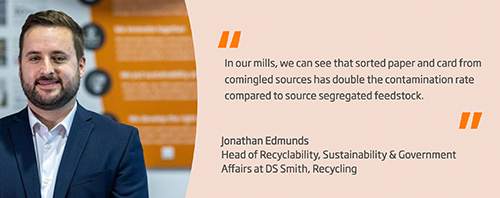DS Smith has reiterated its call for more consistent recycling policies across the UK to improve lagging recycling rates, including a focus on source segregation.
The call follows recent media reports that the UK Government could delay its plans for an extended responsibility for packaging (EPR) scheme, originally due to take effect in 2024. Recently, the Infrastructure and Projects Authority also published its 2023 Project Delivery Confidence reports, which ranked the delivery of the Department for Environment, Food and Rural Affairs’ (DEFRA) packaging reforms as “unachievable”.
The UK is on course to miss its long-term recycling target by up to 13 years, according to modelling by DS Smith. With a recycling rate of 44.6%, Britain has already missed the 50% recycling rate target set by DEFRA, which was due to be achieved by 2020, and is on course to miss the 2025 (55%) and 2030 (65%) targets.
As e-commerce has boomed, leading to more packaging in UK homes, recycling rates in the UK have stagnated. According to Eurostat, the UK ranks 8th in Europe for recycling rates, with other recent comparisons ranking the UK as low as 28th for paper and card recycling.
DS Smith has identified the lack of consistency of recycling infrastructure across England as a key issue. Consumers are faced with 300 or more different recycling systems across England’s local authorities alone, with no current mandate for how recycling is collected. The challenge for residents is particularly stark in major cities like London, where neighbouring streets are faced with differing systems, as local councils each apply their own rules.
This myriad of recycling systems and rules makes clear recycling guidance almost impossible and contributes to general consumer confusion. A survey by YouGov found that more than three quarters (76%) of households add one or more item to their recycling collection that is not accepted by the council. Fewer than 1 in 5 adults (18%) say they are well informed about what they can recycle.
Miles Roberts, Group Chief Executive, DS Smith, said,“The role of paper and cardboard packaging has changed completely over the last decade as consumers have bought more shopping online. With more packaging now coming into the home, our recycling infrastructure needs huge investment and a consistent policy so every householder can effectively recycle.
“If the UK is to successfully transition to a circular economy, we must treat materials such as cardboard, as a currency and not waste. Separate collections of cardboard and paper would reduce contamination, driving up recycling rates and providing millions of pounds to the UK economy. The amount of recyclable cardboard that is going to landfill or incineration in this country today is unacceptable and counter to the country’s ambitions to be one of the world’s environmental leaders.”
While UK overall lags behind, the picture is not consistent across the four nations. Wales has a better overall recycling rate of 56.7%, meaning it has already achieved the 2025 target.
The Welsh government has focused on separate collections for paper, metal, glass and plastics, known as ‘source segregation’. With central funding support for local authorities and a series of policy drivers, Wales has reaped the benefits of a more consistent approach to recycling collections. It also introduced fines for councils of up to £200 per tonne for missing statutory targets, to drive better implementation from local authorities.
Elsewhere in the UK, Scotland has made strides to drive its zero waste and resource efficiency agendas with the launch of a Circular Economy Strategy, while Northern Ireland has made progress in reducing landfill rates.




